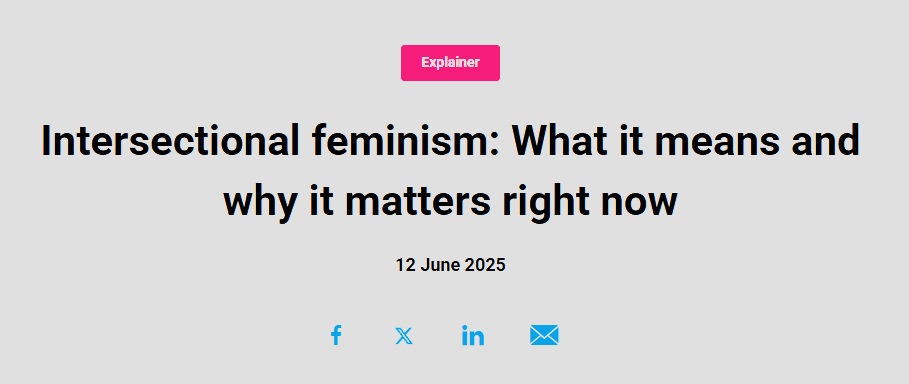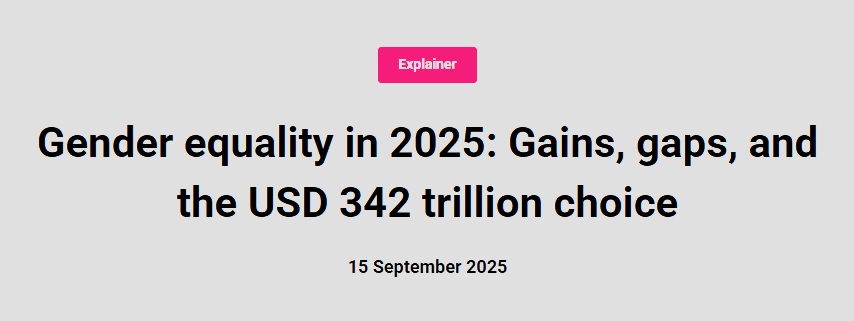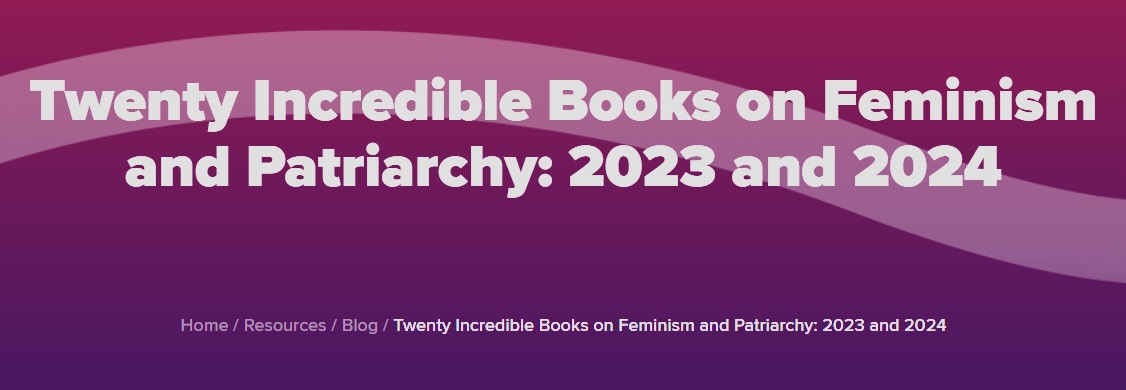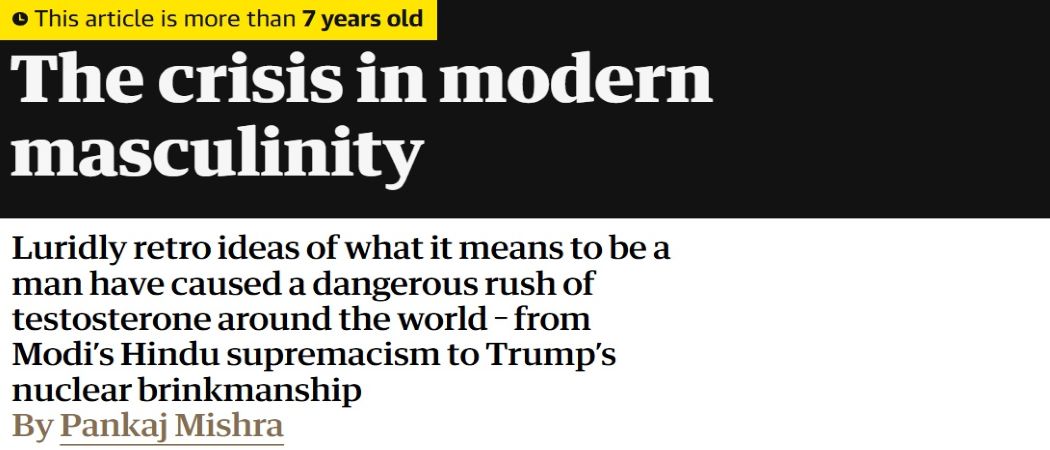Intersectional Feminism and the Climate Crisis: The Perfect Storm of 2024

Climate shocks, tech-driven discrimination, economic stress, and regressive politics are converging into a perfect storm hitting the most marginalized hardest. Intersectional analysis reveals how multiple oppressions interact.
Related Topics
The Perfect Storm of 2024
UN Women warns that we’re facing an unprecedented convergence of crises:
- Climate shocks are destroying livelihoods in the most vulnerable communities
- Tech-driven discrimination is excluding marginalized groups from the digital economy
- Economic stress is disproportionately affecting women and minorities
- Regressive politics threaten hard-won rights
These forces don’t operate in isolation — they interact, creating compounded injustices that hit hardest those at the intersection of multiple marginalizations.
Understanding Intersectionality
Intersectional feminism recognizes that “A Black woman, a trans teenager, or a disabled migrant may face discrimination that is shaped by all parts of their identity.” It’s not just adding different forms of oppression — it’s understanding how they interact and amplify each other.
Analysis Beyond Gender
Modern intersectional feminism now encompasses more than just race and gender intersections. It’s “widely used to illustrate the interplay between any kind of discrimination,” whether based on:
- Gender
- Race
- Age
- Class
- Socioeconomic status
- Physical or mental ability
- Sexual identity
- Religion
- Ethnicity
Real Impact in Asia-Pacific
IWDA’s 2024 report highlights practical applications:
COVID-19’s Unequal Impact
“Women and girls were disproportionally impacted by the COVID-19 pandemic, and this was particularly true for young women in Asia and the Pacific.” The organization works with young women leaders in:
- Cambodia
- Myanmar
- Papua New Guinea
- Fiji
- Samoa
Case Study: Timor-Leste
In Timor-Leste, “class and socioeconomic discrimination intersect with sexism,” creating unique challenges:
- Rural women face multiple barriers to education access
- Poverty compounds gender-based violence
- Language barriers prevent Indigenous women from accessing services
Intersectionality from a Global Perspective
An academic review published in Sociology Compass in April 2024 explores intersectionality within feminist movements from a global perspective, reconstructing the origins of the concept and tracing its evolution.
Key Findings:
- Local contexts matter: Intersectionality manifests differently across cultural and political environments
- Historical legacies shape the present: Colonialism, slavery, and other historical injustices continue to influence contemporary intersectional oppressions
- Solidarity requires work: Building coalitions across differences requires intentional effort and uncomfortable conversations
Listening to Multiply Marginalized Voices
Intersectional feminism “compels us to listen to the people who face multiple forms of oppression and to build solutions that reflect the full picture.”
Voices from the Frontlines:
Trans activist: “We can’t separate trans rights from racial justice or economic equality. For many of us, these struggles are inseparable.”
Indigenous women leader: “Climate change isn’t just an environmental issue — it’s a colonial, capitalist, and patriarchal issue.”
Disabled feminist: “Accessibility isn’t an afterthought — it must be built into the core of our movements from the start.”
Intersectional Solutions in Practice
1. Inclusive Policy-Making
- Ensure marginalized groups participate in decision-making
- Conduct intersectional impact assessments
- Avoid “one-size-fits-all” solutions
2. Resource Allocation
- Prioritize funding for organizations led by multiply marginalized communities
- Support intersectional programs and initiatives
- Recognize that some groups need additional resources to achieve equity
3. Movement Building
- Create spaces where all voices can be heard
- Address power dynamics within movements
- Practice radical inclusion
Urgent Actions for 2024
Immediate Priorities:
- Climate Justice: Center the most vulnerable communities in climate action
- Economic Justice: Address systemic issues that compound inequalities
- Digital Rights: Ensure technology serves everyone, not just the privileged
- Political Participation: Protect and expand voting rights and representation for marginalized groups
The Path Forward
Intersectionality isn’t just a theoretical framework — it’s a necessary tool for understanding and addressing the complex injustices of our time. As UN Women emphasizes: “An intersectional approach allows social policy to become more inclusive and just.”
Everyone Can Practice Intersectionality:
- Educate yourself about different forms of oppression
- Amplify voices from multiply marginalized communities
- Challenge single-issue thinking in your spaces
- Support intersectional organizations and initiatives
- Reflect on your own privileges and blind spots
Conclusion: The Power of Solidarity
The challenges of 2024 are immense, but intersectional feminism offers us a path forward. By recognizing how our struggles are interconnected, we can build stronger movements and create solutions that truly work for everyone.
As Audre Lorde once said: “I am not free while any woman is unfree, even when her shackles are very different from my own.” In 2024, this truth is more urgent than ever.
The future must be intersectional, or it’s not feminist at all.
Related Articles

Beijing+30: A Critical Moment for Global Women's Rights
2025 marks the 30th anniversary of the Beijing Declaration and Platform for Action. Despite progress, 24% of countries report backlash on gender equality, and 10% of women still live in extreme poverty. This is a critical moment to renew commitments.

Breaking Free: Why 'Equality' Is a Patriarchal Lie
New book 'Breaking Free' reveals how 'equality' is a racist, patriarchal ideal that keeps women and marginalized communities chasing an unattainable goal. True liberation requires not equality, but freedom.

The Crisis in Modern Masculinity
This article traces the historical evolution of modern masculinity, revealing the politicization and pathologization of the 'strong man' fantasy on a global scale, and critiques how patriarchy shapes oppressive roles for both men and women.
Support Our Work
If this content has been helpful to you, please consider supporting us to continue curating quality feminist resources
☕ Buy me a coffeeComments & Discussion
Share your views and feelings about this article
Join the Discussion
Share your views and feelings about this article
Loading comments...